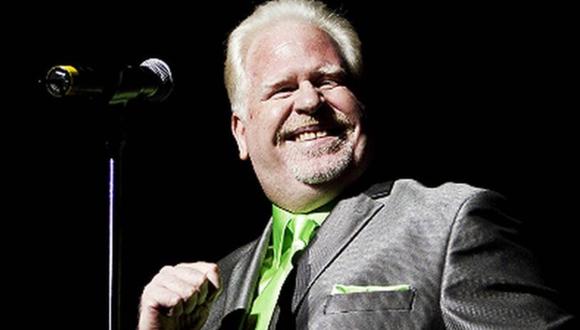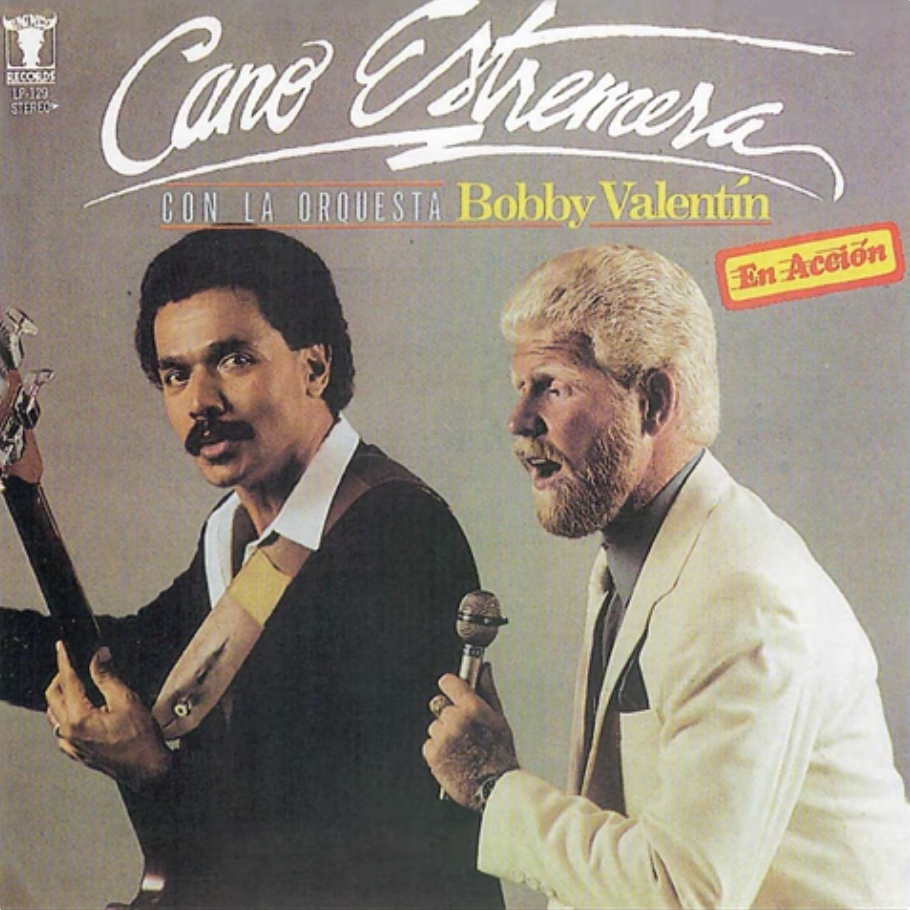Cano Estremera o Carlos Enrique
Estremera Colón, 1958-2020

Falleció
a los 62 años Cano Estremera, “El dueño del soneo,” by PERU21
カノ・エストレメーラ
Cano Estremera o Carlos Enrique
Estremera Colón, 1958-2020

Falleció
a los 62 años Cano Estremera, “El dueño del soneo,” by PERU21
カノ・エストレメラ(出典情報)
こと、カルロ
ス・エンリケ・エストレメラ・コロン(Carlos
Enrique Estremera Colón、1958年9月2日 -
2020年10月28日)は、プエルトリコのサントゥルセ出身のプエルトリコ人の
サルサ歌手[1]。エストレメラは、サルサ音楽に合わせて即興で歌詞を作る驚異的な能力から、「エル・ニーニョ・デ・オロ」( 「黄金の少年」と訳され
る)
、後には 「エル・ドゥエニョ・デル・ソネオ」(「ソネオ」の所有者)と呼ばれるようになった。エストレメラはアルビノで、「エル・カノ」( 「明るい色
の髪の人」 )と呼ばれていた。幼少期、エストレメーラはプエルトリコのサンフアン、サントゥルセにある大規模な公営住宅、
レジデンシアル・ラス・カサスに住んでいた[2]。サントゥ ルセの40あるサブバリオのひとつ、バリオ・オブレロ[3]で他のミュージシャンと共演するう
ちに歌手としての才能を開花させ、ダニエル・サントス、アンディ・モンタニェス、オジー・オカシオなど多くのプエルトリコ人サルサ・ミュージシャンやその
他の有名人が育ったサントゥルセのトラス・タジェレスからほど近い場所にある。エストレメーラは、自らを "el dueño del
soneo"(訳注:ソネオのオーナー)と名乗り、即興演奏家としての才能を強調するマーケティング・コンセプトとして使用するまでは、"el
niño de oro"(訳注:黄金の少年)としてファンに知られていた[4][3][5]。
エストレメーラは、プエルトリコのヒバロ・カントリー・シンガーに強い影響を受けたことを認め、マーヴィン・サンティアゴ、ジルベルト・サンタ・ロサ、オ
スカー・デレオンや、何十ものソネオ(コール・レスポンス形式の即興演奏)を即興で演奏できる他のサルサ・シンガーたちと同じように、早くて巧みな即興演
奏者であるという評判を広めた[3][5]。1990年の夏には、グアニカ、ヤブコア、フアナディアスで即興でそれぞれ105、128、130の「ソネ
オ」を披露した[6]。ルベン・ブラデス(b,1948)によると、彼は1970年代初頭にイスラ・ベルデ
(プエルトリコ)の会場でエストレメラと出会い、そこでエストレメラの才能を喜んだセ
リア・クルス(1925-2003)が彼をステージに上げた[7]。 エ
ストレメラは、サルサのジャム中
に即興で歌詞をつける不思議な能力で有名になった[5]。
ルセの40あるサブバリオのひとつ、バリオ・オブレロ[3]で他のミュージシャンと共演するう
ちに歌手としての才能を開花させ、ダニエル・サントス、アンディ・モンタニェス、オジー・オカシオなど多くのプエルトリコ人サルサ・ミュージシャンやその
他の有名人が育ったサントゥルセのトラス・タジェレスからほど近い場所にある。エストレメーラは、自らを "el dueño del
soneo"(訳注:ソネオのオーナー)と名乗り、即興演奏家としての才能を強調するマーケティング・コンセプトとして使用するまでは、"el
niño de oro"(訳注:黄金の少年)としてファンに知られていた[4][3][5]。
エストレメーラは、プエルトリコのヒバロ・カントリー・シンガーに強い影響を受けたことを認め、マーヴィン・サンティアゴ、ジルベルト・サンタ・ロサ、オ
スカー・デレオンや、何十ものソネオ(コール・レスポンス形式の即興演奏)を即興で演奏できる他のサルサ・シンガーたちと同じように、早くて巧みな即興演
奏者であるという評判を広めた[3][5]。1990年の夏には、グアニカ、ヤブコア、フアナディアスで即興でそれぞれ105、128、130の「ソネ
オ」を披露した[6]。ルベン・ブラデス(b,1948)によると、彼は1970年代初頭にイスラ・ベルデ
(プエルトリコ)の会場でエストレメラと出会い、そこでエストレメラの才能を喜んだセ
リア・クルス(1925-2003)が彼をステージに上げた[7]。 エ
ストレメラは、サルサのジャム中
に即興で歌詞をつける不思議な能力で有名になった[5]。
1978年、エストレメーラはボビー・ヴァレンティンに加入[8]。ヴァレンティンのバンドには、サンティアゴや元ソノラ・ポンセーニャのシンガー、ルイ
ギ・テクシドールらが後任として加わった。1984年に自身のバンドを結成するまで、エストレメーラは6枚のアルバムをレコーディングした。バレンティン
のバンドで最も売れたヒット曲の多くでリード・シンガーを務め、特にロベルト・アングレロが作曲した "La boda de
ella(彼女の結婚式)"[6]はバンドのベストセラーとなった[9]。
エストレメーラはプエルトリコだけでなく、ブラジルやペルーなどでも大成功を収めた。ソロ・アーティストとしての彼の最も有名なヒット曲は、不倫をユーモ
ラスに歌った「El Toro」(「The
Bull」)である。2003年にリリースされたCDは、彼の音楽業界における20周年を祝うものだった。
2013年、エストレメーラは、プエルトリコはもはやサルサ音楽のジャンルを存続させるのに役立っていないと感じているが、コロンビア、ペルー、ベネズエ
ラなどの他の国々はそうだと語っている[10]。また、ステージ上で冒涜的な言葉を使ったという理由で、プエルトリコとコロンビアの会場から退場処分を受
けた2つの事件に直面している[2]。
健康問題と死
エストレメダは、アルビノの人々によく見られる肺線維症と闘っていた。彼の妻によると、 2017年9月にハリケーン・マリアがプエルトリコを襲った後、彼の症状を治療するために必要な薬を見つけることが難しくなり、これが彼の健康状態を悪化 させる原因となった[2][11]。 2018年11月2日、エストレメーラはペンシルベニア州フィラデルフィアの病院で二重肺移植手術を受けた。手術から約1年後、エストレメラはプエルトリ コに戻り、足の筋力を取り戻すために努力し、理学療法を受けていた。フィラデルフィアのペン・メディスンで行われた二重肺移植は驚くべき成功と呼ばれたが [12]、その後2年間、彼は入退院を繰り返し、2020年10月28日にプエルトリコのサンフアンで62歳で亡くなった。最後の入院の際、エストレメー ラは妻のヤミラ・アルセに「疲れた」と言い、「彼を解放してやってくれ」と頼んだ[13]。
| Carlos Enrique
Estremera Colón (2 September 1958 – 28 October 2020) was a Puerto Rican
Salsa singer[1] who was a native of Santurce, Puerto Rico. Estremera
was nicknamed "el niño de oro" (transl. "the golden boy") and later "el
dueño del soneo" (transl. "the owner of "soneo""), for his uncanny
ability to improvise lyrics to Salsa music. Estremera, was albino, and
billed as "El Cano" (transl. "the light-colored hair one"). |
カ
ルロス・エンリケ・エストレメーラ・コロン(1958年9月2日 -
2020年10月28日)はプエルトリコのサルサ歌手[1]。サルサ音楽の歌詞を即興で作るその不思議な才能から、「el niño de
oro(訳注:黄金の少年)」、後に 「el dueño del
soneo(訳注:ソネオの持ち主)」というニックネームで呼ばれるようになった。エストレメラはアルビノで、「エル・カノ」(訳注:明るい色の髪の人)
と呼ばれていた。 |
| Career In his early years, Estremera lived in Residencial Las Casas, a large public housing complex located in Santurce, San Juan, Puerto Rico.[2] Estremera developed his talent as a singer while performing with other musicians in Barrio Obrero, one of the forty subbarrios of Santurce,[3] not far from Tras Talleres, in Santurce, where many Puerto Rican Salsa musicians and other celebrities (such as Daniel Santos, Andy Montañez and Ossie Ocasio) were raised. Estremera was known by his fans as el niño de oro (transl. "the golden boy") until proclaiming himself "el dueño del soneo" (transl. "the owner of "soneo""), which he used as a marketing concept, emphasizing his prowess as an on-the-spot improviser.[4][3][5] Estremera acknowledged Puerto Rican jíbaro country singers as a strong influence and developed a reputation for being a fast and clever improviser, in the same vein as Marvin Santiago, Gilberto Santa Rosa, Oscar D'León and other salsa singers who could improvise dozens of soneos (improvisations within a call–response format).[3][5] Estremera participated in "soneo" battles with other salsa singers,[6] most famously with Domingo Quiñones. In the summer of 1990 performing in Guánica, Yabucoa and Juana Díaz he improvised 105, 128, then 130 "soneos", respectively.[6] According to Ruben Blades, he met Estremera at a venue in Isla Verde (Puerto Rico) in the early 1970s where Celia Cruz, delighted with Estemera's talent brought him onto the stage.[7] Estremera became famous for his uncanny ability to improvise lyrics during Salsa jams.[5] In 1978, Estremera joined Bobby Valentín,[8] among other replacements to Valentin's band -namely Santiago and former Sonora Ponceña singer Luiggi Texidor. Estremera recorded six albums before stating his own band in 1984. He was the lead singer on many of the best selling hits by Valentín's band, particularly the band's best seller ever, "La boda de ella" ("Her Wedding"),[6] written by Roberto Angleró.[9] Estremera enjoyed wild success in Puerto Rico as well as in Brazil and Peru, among other places. His best known hit as a solo artist is "El Toro" ("The Bull"), a humorous take on infidelity (and, in one line, about his low vision). A 2003 CD release celebrated his twenty years in the music industry. In 2013, Estremera said he felt Puerto Rico was no longer instrumental in keeping the Salsa music genre alive, but that other countries such as Colombia, Perú and Venezuela were.[10] He also faced two incidents where he was vetted from venues in Puerto Rico and Colombia for having had used profanity onstage.[2] As a result, he often polled audiences before addressing specific subjects onstage. |
経歴 幼少期、エストレメーラはプエルトリコのサントゥルセにある大規模な公営住宅レジデンシャル・ラス・カサスに住んでいた[2]。エストレメーラは、サン トゥルセの40あるサブバリオのひとつ、バリオ・オブレロで他のミュージシャンと共演しながら歌手としての才能を開花させた[3]。バリオ・オブレロは、 ダニエル・サントス、アンディ・モンタニェス、オジー・オカシオなど、多くのプエルトリコのサルサ・ミュージシャンやその他の有名人が育ったサントゥルセ のトラス・タジェレスからほど近い場所にある。エストレメーラは、自らを 「el dueño del soneo」(訳注:「ソネオ」の所有者)と名乗り、即興演奏家としての才能を強調するマーケティング・コンセプトとして使用するまでは、ファンから 「el niño de oro」(訳注:「黄金の少年」)と呼ばれていた[4][3][5]。 エストレメーラは、プエルトリコのヒバロ・カントリー・シンガーに強い影響を受けたことを認め、マーヴィン・サンティアゴ、ジルベルト・サンタ・ロサ、オ スカー・デレオンや、何十曲ものソネオ(コール・レスポンス形式の即興演奏)を即興で演奏できる他のサルサ・シンガーたちと同じように、速くて巧みな即興 演奏者であるという評判を広めた[3][5]。1990年の夏には、グアニカ、ヤブコア、フアナディアスで即興演奏を行い、それぞれ105回、128回、 130回の「ソネオ」を披露した[6]。 ルーベン・ブラデスによると、彼は1970年代初頭にイスラ・ベルデ(プエルトリコ)の会場でエストレメラと出会い、そこでエストレメラの才能を喜んだセ リア・クルスが彼をステージに上げた[7]。 エストレメラは、サルサのジャム中に即興で歌詞をつける不思議な能力で有名になった[5]。 1978年、エストレメーラはボビー・バレンティンに加入し[8]、サンティアゴや元ソノラ・ポンセーニャのシンガー、ルイギ・テクシドールといったバレ ンティンのバンドの後任となった。1984年に自身のバンドを結成するまで、エストレメーラは6枚のアルバムをレコーディングした。バレンティンのバンド で最も売れたヒット曲の多くでリード・シンガーを務め、特にロベルト・アングレロが作曲した 「La boda de ella(彼女の結婚式)」[6]はバンド史上最も売れた曲となった[9]。 エストレメーラはプエルトリコだけでなく、ブラジルやペルーなどでも大成功を収めた。ソロ・アーティストとしての彼の最も有名なヒット曲は、不倫をユーモ ラスに歌った「El Toro」(「The Bull」)である。2003年にリリースされたCDは、彼の音楽業界における20周年を祝うものだった。 2013年、エストレメーラは、プエルトリコはもはやサルサ音楽のジャンルを存続させるのに役立っていないと感じているが、コロンビア、ペルー、ベネズエ ラといった他の国々はそうだと語っている[10]。また、ステージ上で冒涜的な言葉を使ったという理由で、プエルトリコとコロンビアの会場から退場処分を 受けた2つの事件に直面した[2]。 |
| Health problems and death Estremeda had battled pulmonary fibrosis, a condition that is common among albino people. According to his wife, after Hurricane Maria struck Puerto Rico in September 2017, it became difficult for him to find the medications needed to treat his condition and this caused his health to deteriorate.[2][11] On 2 November 2018, Estremera underwent a dual lung transplant operation at a hospital in Philadelphia, Pennsylvania. After almost a year of his surgery, Estremera was back in Puerto Rico, striving and undergoing physical therapy to regain strength in his legs. The dual lung transplant performed at Penn Medicine in Philadelphia was called an amazing success,[12] however, during the next two years he would be in and out of hospitals until he died in San Juan, Puerto Rico on October 28, 2020, at age 62. In his last hospital stay, Estremera told his wife, Yamira Arce, that he was tired and asked her, "to let him go".[13] Arce said that he told her, "I'm checking in but I won't be leaving" (the hospital) and Arce also noted that Estremera's death was not due to coronavirus.[5][14] |
保健上の問題と死 エストレメダは、アルビノの人民によく見られる肺線維症と闘っていた。彼の妻によると、2017年9月にハリケーン・マリアがプエルトリコを襲った後、彼 の病状を治療するために必要な薬を見つけることが難しくなり、そのために彼の保健が悪化した[2][11]。 2018年11月2日、エストレメーラはペンシルベニア州フィラデルフィアの病院で二重肺移植手術を受けた。手術から約1年後、エストレメラはプエルトリ コに戻り、足の筋力を取り戻すために努力し、理学療法を受けていた。フィラデルフィアのペン・メディシンで行われた二重肺移植は驚くべき成功と呼ばれたが [12]、その後2年間、彼は入退院を繰り返し、2020年10月28日にプエルトリコのサンフアンで62歳で亡くなった。最後の入院で、エストレメーラ は妻のヤミラ・アルセに「疲れた」と言い、「彼を解放してやってくれ」と頼んだ[13]。アルセによれば、彼は「チェックインしているが、(病院を)出る つもりはない」と告げたといい、アルセはまた、エストレメーラの死がコロナウイルスによるものではないと指摘した[5][14]。 |
| Discography Puerto Rican Masters, La Historia de la Salsa (2003) Opera Ecuajey Vol. 1 (2002) Sonora Ponceña 45 Años (1999) Diferente (1999) Encuentro Histórico (1998) Punto y Aparte (1996) Cambio de Sentido (1994) Éxitos del Dueño del Soneo (1991) Dueño del Soneo, Vol.2 (1990) Dueño del Soneo, Vol.1 (1989) Salvaje '88 (1988) El Niño de Oro (1986) With Bobby Valentín En Acción (1984) Brujería (1983) Presenta a el Cano Estremera (1982) Siempre en Forma (1981) El Gato (1980) La Espinita (1979) La Boda de Ella (1978) |
ディスコグラフィ プエルトリコの巨匠たち、サルサの歴史 (2003) オペラ・エクアジェイ Vol.1 (2002) ソノーラ・ポンセーニャ45年 (1999) ディフェレンテ (1999) エンキュエントロ・ヒストリコ(1998年) プント・イ・アパート(1996年) 感覚の変化(1994年) ドゥエニョ・デル・ソネオ(1991年) ドゥエニョ・デル・ソネオ第2巻(1990年) ドゥエニョ・デル・ソネオ第1巻(1989年) サルバヘ'88(1988年) エル・ニーニョ・デ・オロ(1986年) ボビー・バレンティンとの共演 イン・アクション(1984年) 邪術 (1983) 永遠のカヌーを贈ろう(1982年) シェンプレ・エン・フォルマ(1981年) エル・ガトー(1980年) ラ・エスピニータ(1979年) エラの誕生 (1978) |
| Larkin, Colin (1995). The
Guinness encyclopedia of popular music. (Threepenny Opera – Z.Z. Top).
Vol. 6. Guinness Pub. p. 4293. ISBN 978-0-85112-662-3. "Nos dejó toda una leyenda... Cano Estremera... "La boda de ella... tiene que ser la mejor..."". RevistaZetta.com (in Spanish). Archived from the original on 1 November 2020. Retrieved 16 January 2021. "Cano Estremera". Fundación Nacional para la Cultura Popular (in Spanish). 12 November 2020. Archived from the original on 3 February 2020. Retrieved 16 January 2021. Retamal, Brenda García (28 October 2020). "Cano Estremera, el "Dueño del soneo", falleció a los 62 años". RPP (in Spanish). Archived from the original on 23 November 2020. Retrieved 16 January 2021. Castro, Gabriela (28 October 2020). "Falleció el cantante albino "Cano Estremera"". AhoraMismo.com (in Spanish). Archived from the original on 16 January 2021. Retrieved 16 January 2021. "Reportan muerte del cantante Cano Estremera". Telemundo Puerto Rico (in Spanish). 28 October 2020. Archived from the original on 1 November 2020. Retrieved 16 January 2021. "Rubén Blades habla sobre la última vez que vio a Cano Estremera: "Estaba como siempre, reído y optimista"". El Bocón (in Spanish). 29 October 2020. Archived from the original on 20 November 2020. Retrieved 16 January 2021. "El Cano Estremera - Salsero del mes". Latinastereo.com (in Spanish). Archived from the original on 29 December 2019. Retrieved 16 January 2021. "Al infinito Roberto Angleró". Fundación Nacional para la Cultura Popular (in Spanish). 28 April 2018. Archived from the original on 16 January 2021. Retrieved 16 January 2021. "Fallece el salsero puertorriqueño Cano Estremera". Los Angeles Times en Español (in Spanish). 28 October 2020. Archived from the original on 25 November 2020. Retrieved 16 January 2021. Marrero-Rodríguez, Rosalina (25 September 2018). "Delicado el estado de salud de Cano Estremera". Primera Hora (in Spanish). Archived from the original on 29 September 2018. Retrieved 17 March 2019. ""Cano" Estremera: "Lo importante es que estoy respirando"". El Nuevo Dia (in Spanish). 9 April 2019. Archived from the original on 10 April 2019. Retrieved 17 September 2019. "Cano a su esposa antes de fallecer: «Necesito que me dejes ir". Salserísimo Perú | Salsa es Cultura (in Spanish). 31 October 2020. Archived from the original on 25 November 2020. Retrieved 16 January 2021. Mercado, Damaris Hernández (30 October 2020). "Los últimos días de Cano Estremera: "Voy a entrar aquí y de aquí no voy a salir"". El Nuevo Día (in Spanish). Archived from the original on 17 November 2020. Retrieved 16 January 2021. |
ラーキン、コリン (1995).
ポピュラー音楽のギネス百科事典。(スリーペニー・オペラ - Z.Z.トップ). ギネス・パブ. p. 4293. ISBN
978-0-85112-662-3. "私たちは一つの伝説を作った.... カノ・エストレメーラ 「カノ・エストレメーラ... 「エラの結婚式は...最高のものでなければならない...」. RevistaZetta.com(スペイン語)". 2020年11月1日にオリジナルからアーカイブされた。2021年1月16日取得。 「Cano Estremera」. Fundación Nacional para la Cultura Popular(スペイン語). 12 November 2020. Archived from the original on 3 February 2020. 2021年1月16日。 Retamal, Brenda García (28 October 2020). 「Cano Estremera, el Dueño del soneo, falduces a los 62ños」. RPP(スペイン語). 2020年11月23日にオリジナルからアーカイブされた。2021年1月16日取得。 Castro, Gabriela (28 October 2020). 「Falleció el cantante albino 」Cano Estremera「」. AhoraMismo.com (スペイン語). 2021年1月16日にオリジナルからアーカイブされた。2021年1月16日. 「Reportan muerte del cantante Cano Estremera」. Telemundo Puerto Rico (in Spanish). 28 October 2020. 2020年11月1日に原文からアーカイブされた。2021年1月16日。 "ルベン・ブラデスがカノ・エストレメーラに会った最後の機会について語った: 「ルベン・ブラデスは、カノ・エストレーメラと会った最後の機会について次のように語っている。El Bocón(スペイン語). 29 October 2020. 20 November 2020. 2021年1月16日取得。 「El Cano Estremera - Salsero del mes」. Latinastereo.com (スペイン語). 2019年12月29日にオリジナルからアーカイブされた。2021年1月16日取得。 「Al infinito Roberto Angleró」. Fundación Nacional para la Cultura Popular(スペイン語). 28 April 2018. Archived from the original on 16 January 2021. Retrieved 16 January 2021. 「Fallece el salsero puertorriqueño Cano Estremera」. Los Angeles Times en Español(スペイン語). 28 October 2020. Archived from the original on 25 November 2020. 2021年1月16日に更新された。 Marrero-Rodríguez, Rosalina (25 September 2018). 「Delicado el estado de salud de Cano Estremera」. Primera Hora(スペイン語). 2018年9月29日に原文からアーカイブされた。2019年3月17日取得。 「」Cano" Estremera: 「Lo importante es que estoy respirando」". El Nuevo Dia(スペイン語)。9 April 2019. 2019年4月10日に原文からアーカイブされた。2019年9月17日を取得した。 "Cano a su esposa antes de fallecer: 「Necesito que me dejes ir」. Salserísimo Perú|Salsa es Cultura(スペイン語). 31 October 2020. Archived from the original on 25 November 2020. 2021年1月16日取得。 Mercado, Damaris Hernández (30 October 2020). 「カノ・エストレメーラの最後の日々: 「ここに入り、ここから出ることはない". El Nuevo Día(スペイン語)". 17 November 2020. 2021年1月16日取得。 |
| https://en.wikipedia.org/wiki/Cano_Estremera |
|
| References 01. Larkin, Colin (1995). The Guinness encyclopedia of popular music. (Threepenny Opera – Z.Z. Top). Vol. 6. Guinness Pub. p. 4293. ISBN 978-0-85112-662-3. "Nos dejó toda una leyenda... Cano Estremera... "La boda de ella... tiene que ser la mejor..."". RevistaZetta.com (in Spanish). Archived from the original on 1 November 2020. Retrieved 16 January 2021. "Cano Estremera". Fundación Nacional para la Cultura Popular (in Spanish). 12 November 2020. Archived from the original on 3 February 2020. Retrieved 16 January 2021. Retamal, Brenda García (28 October 2020). "Cano Estremera, el "Dueño del soneo", falleció a los 62 años". RPP (in Spanish). Archived from the original on 23 November 2020. Retrieved 16 January 2021. Castro, Gabriela (28 October 2020). "Falleció el cantante albino "Cano Estremera"". AhoraMismo.com (in Spanish). Archived from the original on 16 January 2021. Retrieved 16 January 2021. "Reportan muerte del cantante Cano Estremera". Telemundo Puerto Rico (in Spanish). 28 October 2020. Archived from the original on 1 November 2020. Retrieved 16 January 2021. "Rubén Blades habla sobre la última vez que vio a Cano Estremera: "Estaba como siempre, reído y optimista"". El Bocón (in Spanish). 29 October 2020. Archived from the original on 20 November 2020. Retrieved 16 January 2021. "El Cano Estremera - Salsero del mes". Latinastereo.com (in Spanish). Archived from the original on 29 December 2019. Retrieved 16 January 2021. "Al infinito Roberto Angleró". Fundación Nacional para la Cultura Popular (in Spanish). 28 April 2018. Archived from the original on 16 January 2021. Retrieved 16 January 2021. 10. "Fallece el salsero puertorriqueño Cano Estremera". Los Angeles Times en Español (in Spanish). 28 October 2020. Archived from the original on 25 November 2020. Retrieved 16 January 2021. Marrero-Rodríguez, Rosalina (25 September 2018). "Delicado el estado de salud de Cano Estremera". Primera Hora (in Spanish). Archived from the original on 29 September 2018. Retrieved 17 March 2019. ""Cano" Estremera: "Lo importante es que estoy respirando"". El Nuevo Dia (in Spanish). 9 April 2019. Archived from the original on 10 April 2019. Retrieved 17 September 2019. "Cano a su esposa antes de fallecer: «Necesito que me dejes ir". Salserísimo Perú | Salsa es Cultura (in Spanish). 31 October 2020. Archived from the original on 25 November 2020. Retrieved 16 January 2021. 14. Mercado, Damaris Hernández (30 October 2020). "Los últimos días de Cano Estremera: "Voy a entrar aquí y de aquí no voy a salir"". El Nuevo Día (in Spanish). Archived from the original on 17 November 2020. Retrieved 16 January 2021. |
参考文献 01. ラーキン、コリン (1995). 『ギネス・ポピュラー音楽事典』 (スリーペニー・オペラ – Z.Z.トップ). 第6巻. ギネス出版. p. 4293. ISBN 978-0-85112-662-3. 「彼女は伝説を残した…カノ・エストレメラ… 「彼女の結婚式は…最高でなければならない…」」. RevistaZetta.com(スペイン語). 2020年11月1日時点のオリジナルからアーカイブ. 2021年1月16日閲覧. 「カノ・エストレメラ」. 国民文化振興財団(スペイン語). 2020年11月12日. 2020年2月3日にオリジナルからアーカイブ。2021年1月16日に取得。 レタマル、ブレンダ・ガルシア(2020年10月28日)。「カノ・エストレメラ、『ソンエオの主』が62歳で死去」。RPP(スペイン語)。2020年11月23日にオリジナルからアーカイブ。2021年1月16日閲覧。 カストロ、ガブリエラ(2020年10月28日)。「アルビノ歌手『カノ・エストレメラ』死去」。アオラミスマ・コム(スペイン語)。2021年1月16日にオリジナルからアーカイブ。2021年1月16日閲覧。 「歌手カノ・エストレメラの死が報じられる」。テレムンド・プエルトリコ(スペイン語)。2020年10月28日。2020年11月1日にオリジナルからアーカイブ。2021年1月16日に閲覧。 「ルベン・ブレイズ、カノ・エストレメラに最後に会った時のことを語る:『いつも通り、笑顔で楽観的だった』」。エル・ボコン(スペイン語)。2020年10月29日。2020年11月20日にオリジナルからアーカイブ。2021年1月16日に閲覧。 「エル・カノ・エストレメラ - 今月のサルセロ」。ラティナステレオ・コム(スペイン語)。2019年12月29日にオリジナルからアーカイブ。2021年1月16日に閲覧。 「アル・インフィニート・ロベルト・アングレロ」。国民文化振興財団(スペイン語)。2018年4月28日。2021年1月16日にオリジナルからアーカイブ。2021年1月16日に閲覧。 10. 「プエルトリコのサルサ歌手カノ・エストレメラ死去」。ロサンゼルス・タイムズ・エン・エスパニョール(スペイン語)。2020年10月28日。2020年11月25日にオリジナルからアーカイブ。2021年1月16日に取得。 マレロ=ロドリゲス、ロサリーナ(2018年9月25日)。「カノ・エストレメラの健康状態は深刻」。プリメーラ・オラ(スペイン語)。2018年9月29日にオリジナルからアーカイブ。2019年3月17日に閲覧。 「カノ」エストレメラ:「重要なのは、俺が息をしていることだ」。エル・ヌエボ・ディア(スペイン語)。2019年4月9日。2019年4月10日にオリジナルからアーカイブ。2019年9月17日に閲覧。 「カノが亡くなる前に妻に言った言葉:『俺を解放してくれ』」。サルセリスィモ・ペルー | サルサは文化(スペイン語)。2020年10月31日。2020年11月25日にオリジナルからアーカイブ。2021年1月16日に閲覧。 14. メルカド、ダマリス・エルナンデス (2020年10月30日). 「カノ・エストレメラの最期の日々:『ここに入って、もう出ない』」. エル・ヌエボ・ディア (スペイン語). 2020年11月17日にオリジナルからアーカイブ. 2021年1月16日に閲覧. |
◎スペイン語Wikiからの翻訳
カルロス・エンリケ・エストレメーラ・コ
ロン(1958年9月2日サントゥルセ -
2020年10月28日サンフアン)1は、カノ・エストレメーラとして知られるプエルトリコのサルサ・シンガー。
バイオグラフィー
サントゥルセのバリオ・オブレロ地区で結成されたミュージシャン・グループのパーカッショニ
ストとしてプロの世界に入る。1年も経たないうちに、そのグループのヴォーカリストとなり、フォルクローレ・グループ、ロス・プレネロス・デル・キント・
オリボのヴォーカリストとなる。しかし、ファニア・レコードと専属契約を結んでいたオルケスタ・ムレンゼ76に参加したとき、彼の最大のブレイクが訪れ
た。1978年、ボビー・バレンティンに出会い、彼のバンドに誘われた。バレンティンのグループで最初にレコーディングした曲は「La boda de
ella」で、ポピュラー音楽界で広く賞賛された。バレンティンとは6枚のアルバムをレコーディングし、うち2枚はソロ・アーティストとして活動した。し
かし、1984年末、バレンティンを離れ、自身のバンドを結成することを決意。
この新しいステージでは、"エル・カノ
"と呼ばれ、あらゆるジャンルのポピュラー音楽を歌うことに専念した。1986年、パオリ賞サルサ・ヴォーカリスト・オブ・ザ・イヤーを受賞。1988
年、アルバム『Salvaje』でプロデューサーとしてデビュー。その1年後、新シリーズ "Dueño del Soneo
"をリリース。アルビノとして生まれたエル・カノは、音楽業界では今世紀最高の
"ソネーロ"(アフロ・カリビアン・ミュージックの歌手)の一人として知られている。グアニカで行われた有名なコンサートでは、105のスタンザを1フ
レーズも繰り返すことなく歌い上げた。かなりの偉業である。その数週間後、フアナディアスでのコンサートでは5000人の観客を前に、その数は130に増
えた。
他のミュージシャンの追随を許さない鋭い即興演奏で、エストレメーラは "titular de la
soneo"(ソネオの支配者)と呼ばれるようになった。彼のヒット・アルバム『ドゥエーニョ・デル・ソネオ』第1巻には、Por Si
Acasoなどのサルサ・トラックが収録されている。また、『Dueño del Soneo, Vol.2』と『Éxitos del Dueño
del Soneo』もある。エストレメーラのヒット曲としては、"La boda de ella"、
"Te amaré"、"Eres
tú"[otra
version]、"Se busca"[otra version]、"Ámame en cámara
lenta"[otra
version]、"Las ingratitudes"[otra version]、"Manuel
García"[otra
version]、"Si me caso mejoro"[otra version]、"La mujer y la primavera"[otra version]、"Me quedé con las
ganas"[otra
version]、"El Caimán"[otra
version]、"La novia automática"[otra
version]、"Awilda"[otra
version]、"El compromiseiso"[otra
version]、"Nací y así
soy"[otra version]、"Aprovecha lo mío"、
"Viernes social "[otra version]、 "Canta Mi Gallo"な
どが有名。
カノ・エストレメーラは2020年10月28日、プエルトリコのサンフアンで死去、享年62歳1。肺線維症のため近年健康問題に悩まされていたが、
2017年に肺移植を受け、ビジャ・パルメラス墓地に埋葬された。
| Carlos Enrique
Estremera Colón (Santurce, 2 de septiembre de 1958 - San Juan, 28 de
octubre de 2020)1 más conocido como Cano Estremera, fue un cantante de
salsa puertorriqueño. |
カルロス・エンリケ・エストレメーラ・コロン(1958年9月2日サン
トゥルセ - 2020年10月28日サンフアン)1、通称カノ・エストレメーラはプエルトリコのサルサ・シンガーである。 |
| Biografía Comenzó en el mundo profesional como percusionista con un grupo de músicos que se formó en el Barrio Obrero de Santurce sección. Dentro de un año, fue vocalista de ese grupo y con la plena grupo folclórico: Los Pleneros del Quinto Olivo. Pero su mayor oportunidad llegó a unirse a la Orquesta Mulenze 76, que tenía un contrato exclusivo con Fania Records. En 1978, se reunió con Bobby Valentín, que lo invitó a unirse a su banda. La primera canción que grabó con el grupo de Valentín fue "La boda de ella" que le ganó la aclamación generalizada en el mundo de la música popular. Grabó seis discos con Valentín, incluyendo dos como solista. Pero a finales de 1984, decidió abandonar a Valentín para formar su propia banda. En esta nueva etapa, "El Cano", como era conocido, se dedicó a cantar todos los géneros de la música popular. En 1986 ganó el premio Paoli como Vocalista de Salsa del Año, y otros premios. En 1988, Estremera debutó como productor de sus propios registros con su álbum "Salvaje". Un año más tarde, dio a conocer "Dueño del Soneo", que su nueva serie de grabaciones. El Cano, que nació albino, es conocido en la industria de la música como uno de los mejores "Soneros", o cantante de música Afro-Caribeña, en el siglo. Su habilidad se demostró en un ahora famoso concierto en Guánica, donde la arena 105 estrofas consecutivos sin repetir una sola frase. Todo un logro. En ese mismo año, sus habilidades de improvisación se ponen a prueba una vez más y produjo 128 única "soneos" en el concierto para fanes en Yabucoa, mientras que unas pocas semanas más tarde, ante 5000 espectadores en un concierto en Juana Díaz, ese número aumentó a 130. Con un afilado destreza en improvisar sin par, Estremera, ganó el epíteto de "titular de la soneo", un título que prácticamente ha sustituido al "el niño de oro" de la que fue inicialmente conocido, y que se utilizó en el título de dos de sus grabaciones. Su álbum hit Dueño del Soneo, Vol. 1, incluyen la salsa, como las pistas Por Si Acaso y mucho más. También se Dueño del Soneo, Vol. 2 y Éxitos del Dueño del Soneo. Entre sus éxitos musicales, Estremera es más conocido por canciones como "La boda de ella", "Te amaré", "Eres tú", "Se busca", "Ámame en cámara lenta", "Las ingratitudes", "Manuel García", "Si me caso mejoro", "La mujer y la primavera", "Me quedé con las ganas", "La novia automática", "Awilda", "El compromiso", "Nací y así soy", "Aprovecha lo mío" y "Viernes social". Cano Estremera fallece en San Juan, Puerto Rico el 28 de octubre de 2020 a los 62 años.1 Había estado sufriendo los últimos años de problemas de salud debido a una fibrosis pulmonar habiendo recibido en 2017 un trasplante de pulmón, fue sepultado en el Cementerio de Villa Palmeras. |
バイオグラフィー サントゥルセのバリオ・オブレロ地区で結成されたグループのパーカッショニストとしてプロの世界に入る。年以内に、そのグループのヴォーカリストとなり、 またフォークロア・グループ、ロス・プレネロス・デル・キント・オリーボのヴォーカリストとなる。しかし、ファニア・レコードと専属契約を結んでいたオル ケスタ・ムレンゼ76に加入したことで、最大のブレイクを果たす。1978年、ボビー・バレンティンに出会い、彼のバンドに誘われた。バレンティンのグ ループで最初にレコーディングした曲は「La boda de ella」で、ポピュラー音楽界で広く賞賛された。バレンティンとは6枚のアルバムをレコーディングし、うち2枚はソロ・アーティストとして活動した。し かし、1984年末、彼はバレンティンを離れ、自分のバンドを結成することを決めた。 この新しいステージでは、「エル・カノ 」として知られる彼は、あらゆるジャンルのポピュラー音楽を歌うことに専念した。1986年には、パオリ賞のサルサ・ヴォーカリスト・オブ・ザ・イヤーを 受賞した。1988年、エストレメーラはアルバム『Salvaje』で自身のレコードのプロデューサーとしてデビューした。その1年後、新シリーズ 『Dueño del Soneo』をリリースした。アルビノとして生まれたエル・カノは、音楽業界では今世紀最高の 「ソネーロ」(アフロ・カリビアン・ミュージックの歌手)の一人として知られている。グアニカで行われた有名なコンサートでは、105のスタンザを1フ レーズも繰り返すことなく歌い上げた。かなりの偉業だ。その数週間後、フアナディアスでのコンサートでは5000人の観客を前に、その数は130に増え た。 他のミュージシャンの追随を許さない鋭い即興演奏で、エストレメーラは 「titular de la soneo」(ソネオの支配者)という称号を得た。彼のヒット・アルバム『Dueño del Soneo, Vol.1』には、Por Si Acasoなどのサルサ・トラックが収録されている。また、『Dueño del Soneo, Vol.2』と『Éxitos del Dueño del Soneo』もある。エストレメーラのヒット曲としては、「La boda de ella」、「Te amaré」、「Eres tú」、「Se busca」、「Ámame en cámara lenta」、「Las ingratitudes」、「Manuel García」、「Si me caso mejoro」、「La mujer y la primavera」、「Me quedé con las ganas」、「La novia automática」、『Awilda』、「El compromiseiso」、「Nací y así soy」、「Aprovecha lo mío」、「Viernes social 」などが有名である。 カノ・エストレメーラは2020年10月28日、プエルトリコのサンフアンで死去、享年62歳1。近年、肺線維症による健康問題に悩まされていたが、 2017年に肺移植を受け、ビジャ・パルメラス墓地に埋葬された。 |
| Discografía Ópera Ecuajey, vol. 1 (2002) Diferente (1999) Punto y aparte (1996) Cambio de sentido (1994) Éxitos del dueño del soneo (1991) Dueño del soneo, vol. 2 (1990) Dueño del soneo, vol. 1 (1989) Salvaje '88 (1988) El Niño de Oro (1986) Con Bobby Valentin Encuentro histórico (recopilación) (1998) En acción (1984) Brujería (como corista) (1983) Presenta a el Cano Estremera (1982) Siempre en forma (1981) El Gato (1980) La espinita (1979) La boda de ella (1978) |
ディスコグラフィ オペラ・エクアヘイ 第1巻 (2002) ディファレント (1999) プント・イ・アパルト (1996) 感覚の変化 (1994) エグジットス・デル・デューニョ・デル・ソネオ (1991) ドゥエニョ・デル・ソネオ 第2巻(1990年) ドゥエニョ・デル・ソネオ第1巻(1989年) サルバジェ'88(1988年) エル・ニーニョ・デ・オロ(1986年) ボビー・バレンティンとの共演 エンキュエントロ・ヒストリコ(コンピレーション) (1998) イン・アクション (1984) 邪術(バック・ヴォーカリストとして)(1983年) カノ・エストレメーラ・プレゼンツ(1982年) シエンプレ・エン・フォルマ(1981年) エル・ガト(1980年) ラ・エスピニータ(1979年) ラ・ボダ・デ・エラ(1978) |
| https://es.wikipedia.org/wiki/Cano_Estremera |
Pa Bravo Yo Pa
Bravo Yo / Cano Estremera Feat. Orquesta Mambele / Club Lawn Tennis
/ 2016
ディスコグラフィー
プエルトリコ マスターズ、ラ ヒストリア デ ラ サルサ(2003)
オペラエクアジェイ Vol. 1 (2002)
ソノラ ポンセーニャ 45 アニョス(1999)
ディフェレンテ(1999)
歴史の歴史(1998)
プント・イ・アパルテ(1996)
カンビオ・デ・センティド(1994)
エクシトス デル ドゥエニョ デル ソネオ(1991)
ドゥエニョ デル ソネオ Vol.2 (1990)
ドゥエニョ デル ソネオ Vol.1 (1989)
サルバヘ '88 (1988)
エルニーニョ デ オロ(1986)
ボビー・バレンティンと
アン・アクシオン(1984)
ブルジェリア(1983)
プレゼンタ・ア・エル・カノ・エストレメラ(1982)
シエンプレ・アン・フォルマ(1981)
エル・ガトー(1980)
ラ・エスピニータ(1979)
ラ・ボダ・デ・エラ(1978)
https://en.wikipedia.org/wiki/Cano_Estremera
リンク
文献
その他の情報
-----------
For all undergraduate
students!!!, you do not paste but [re]think my message.
Remind Wittgenstein's phrase,
"I should not like my writing to spare other people the trouble of thinking. But, if possible, to stimulate someone to thoughts of his own," - Ludwig Wittgenstein
Copyleft, CC, Mitzub'ixi Quq Chi'j,
1996-2099

++
Copyleft,
CC, Mitzub'ixi Quq Chi'j, 1996-2099